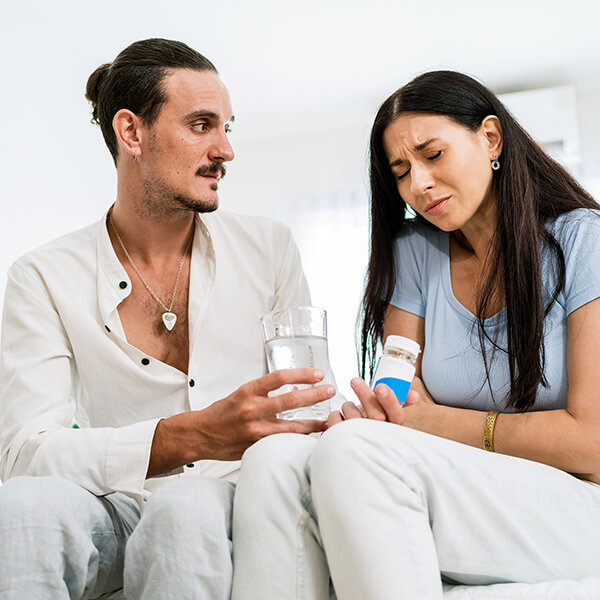
Chronic pain in intimacy means ongoing discomfort during or after sex that lasts for more than three months. It can affect anyone and often leads to stress or fear. Visit our DOXXES store on North Freeway / FM 1960 for products that support comfort, healing, and connection.
What Is Chronic Pain in Intimacy?
This condition refers to persistent pain in the pelvic or genital area that occurs during or after sexual activity.
Types include:
- Superficial pain: felt at the skin or vaginal opening
- Deep pain: felt in the pelvis or internal organs
- Provoked pain: triggered by touch, movement, or pressure
This pain can range from mild to severe and may come and go or stay constant.
Why Does It Happen?
Emotional causes:
- Anxiety, stress, or fear related to sex
- Past trauma or abuse
- Low self-esteem or body image concerns
- Relationship stress or poor communication
Physical causes:
- Infections or inflammation
- Hormonal changes (e.g., menopause)
- Pelvic floor dysfunction (tight or weak muscles)
- Conditions like endometriosis, vulvodynia, or chronic prostatitis
Many people experience both physical and emotional causes together.
Examples and How to Track Triggers
Examples include:
- Burning or stinging at the vaginal opening (vulvodynia)
- Pelvic cramping with deep penetration (endometriosis)
- Pain around the perineum in men (chronic prostatitis)
- Arthritis flare-ups causing joint pain during intimacy
Tips to spot triggers:
- Keep a journal of when pain happens and what activities may be linked
- Try different positions or use more lubrication
- Track your stress levels, sleep, and energy each day
Who Is Affected?
Anyone—regardless of gender, age, or identity—can experience this condition.
- Women may feel tightness, dryness, or pain from pelvic floor issues.
- Men may have testicular, prostate, or pelvic pain.
- Partners may feel guilt, frustration, or emotional distance.
It often affects self-confidence and the ability to enjoy closeness.
How a Sex Therapist Can Help
A sex therapist can:
- Talk through your sexual and emotional history
- Identify patterns (like pain with certain positions or times of day)
- Offer tools to reduce anxiety or fear
- Help couples rebuild trust, comfort, and confidence
Ways to Treat and Manage Chronic Pain in Intimacy
Therapy and Support
- Counseling for anxiety, stress, or trauma
- Couples therapy to improve communication and connection
Physical Tools and Techniques
- Use lubricants (water-based or silicone) to reduce friction
- Explore comfortable sex positions that reduce pressure
- Practice pelvic floor stretches to improve flexibility
- Use topical numbing gels for sensitive areas (with medical guidance)
Medical Treatments
- Physical therapy
- Medication for pain, inflammation, or hormonal balance
- Surgery in rare cases, based on your condition

How DOXXES.LOVE Can Help
At DOXXES.LOVE, we offer:
- Water-based lubricants for sensitive skin
- Adjustable pelvic floor exercisers
- Low-intensity vibrators for gentle stimulation
- Prostate massagers with body-safe design
All products include instructions for safe use. Many people find combining these tools with therapy speeds healing and comfort.
How to Talk About Chronic Pain in Intimacy
- Start with honesty and kindness.
- Use “I” statements: “I feel pain during...” or “I’m worried this is affecting us.”
- Choose a quiet time to talk without distractions
- Learn together—read articles, watch videos, or see a therapist
- Support each other emotionally as you find solutions
Visit DOXXES on North Freeway / FM 1960
Visit our welcoming, discreet shop where our team can help you explore products tailored to your comfort. You don’t need an appointment—just come in for personalized support.
Conclusion
Chronic pain in intimacy can be managed with the right help. Whether the cause is physical, emotional, or both, solutions are available. Visit DOXXES on North Freeway / FM 1960 for tools and guidance to feel more at ease and connected again.
FAQs About Chronic Pain in Intimacy
- What is chronic pain in intimacy?
It refers to pain that happens during or after sexual activity and lasts for more than three months. - What causes it?
Common causes include endometriosis, infections, tight pelvic floor muscles, trauma, or hormonal shifts. - Is it normal to feel pain during sex?
Some mild discomfort may happen sometimes, but frequent or severe pain is not normal and should be evaluated. - Can both men and women be affected?
Yes. Women may report it more often, but men can also experience painful intercourse. - How is it diagnosed?
Through a detailed health history, physical exam, and sometimes imaging or lab tests. - What treatments are available?
Counseling, physical therapy, medications, or medical procedures may help, depending on the cause. - Can emotional trauma play a role?
Yes, trauma and anxiety can increase muscle tension and pain responses. - Can lubricants help?
Yes. They reduce friction and are helpful for dryness or sensitive skin. - Does this condition affect relationships?
It can cause strain, but open communication and care can improve connection and intimacy. - Should I stop being sexually active?
Not necessarily. You may just need a plan that helps you feel safe and comfortable again.
